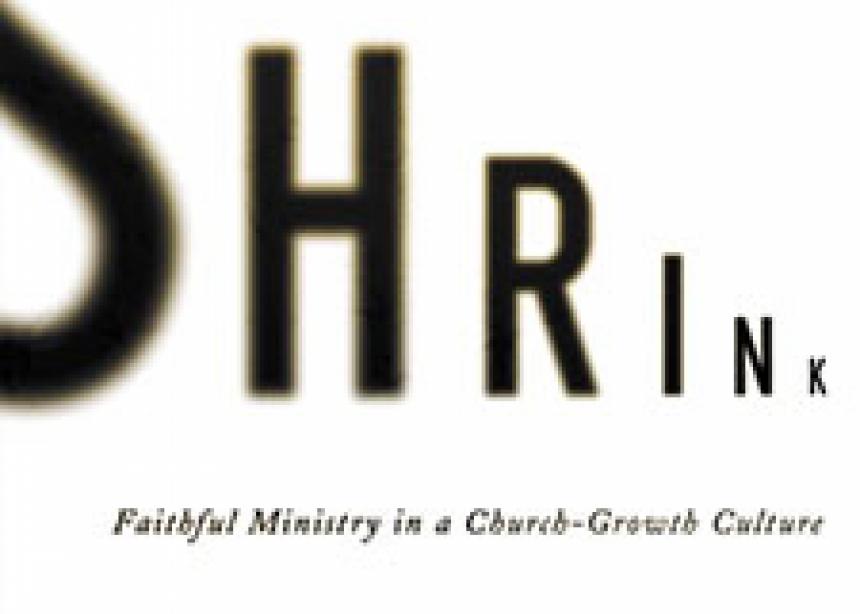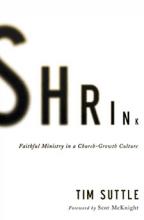“Church growth strategies are the death gurgle of a church that has lost its way,” is how Stanley Hauerwas describes this book, noting that, “God is making us leaner and meaner.”
This insightful analysis of contemporary churches comes from a pastor who wanted to become a great leader by using “successful” pastors as his model. Tim Suttle attended seminars on church growth where he met strategies borrowed from the business world. At leadership conferences pastors are told to “dream big” and embrace the latest strategy.
“I mimicked the leadership practices of the mega-church,” he said.
Those sessions leave many pastors feeling bad about not being bigger. Church leaders love models, and try to solve problems by finding models of success and copying them.
A common assumption is that the church’s job is to grow. “[T]his assumption is built not on the gospel but on the American narrative. The church’s job is to be faithful.” He sees current church leadership conversations focusing on the American way of growth and expansion, not on the Christian narrative.
The American narrative teaches that life is about growing, expanding, winning, gaining and impressing. Suttle admits to being part of the “bigger is better” dream. “I spent over a decade chasing bigger, better, higher, faster, stronger,” he says.
Suttle started a church with two families that grew to 200 in three years. “But when we decided to stop chasing success to pursue faithfulness, we lost 50% of our people,” he writes. If pressed about his church’s growth strategy, he usually says it is to get smaller and die.
Christian leadership is often about what works, makes us grow, gets results, and is most effective while faithfulness takes a back seat. Pastors have morphed into CEOs, he says, “[W]e need a leadership narrative built on Jesus’ vision of the kingdom . . . always the way of descent.”
He describes the mega-church (2000 or more) as a body on steroids. “Our celebrated church leaders have been feeding the church the equivalent of performance-enhancing drugs. God save us from a successful church,” he says.
Suttle notes Willow Creek’s own critique showing that the mega-church has been wonderful in its ability to make Jesus fans, not necessarily followers. He believes the mega-church reflects the way of our culture, not the way of Jesus; the demands of discipleship run contrary to the needs of the organization.
While providing a needed critique of the mega-church, Suttle is not as helpful in the solutions department. He talks about faithfulness but does not articulate sufficiently what it would look like. This becomes problematic when churches try to be faithful by being “missional” since Suttle sees “missional” merely as another strategy.
He suggests vulnerability, risk, gentleness, emotional uncertainty and caring for the “least of these” as essential characteristics of the church—a strong service orientation. He says we should stop asking how many people attend our church.
In order to make Christianity acceptable in our day the gospel has to be sterilized and rendered impotent and harmless. “The temptation is to be relevant, powerful, spectacular.”
With church attendance declining in North America, this might well be a prophet we should heed. Shrink, be freed from ambition, give up the desire to draw a crowd. “What if God wants the America church to shrink?”




Comments
In a day when traditional Church attendance is "shrinking", it seems hard to have a vision for the future, especially when simple Church ministries and tasks seem to be harder to perform due to a lack of commitment or simply a lack of numbers. Yet the gospel has not lost its relevance; we are still sinners in need of grace, in need of a loving relationship with God. Jesus is just as present as before (where two or more are gathered in [Jesus'] name, [He] is present in the midst of them-Matthew 18:20). Where actual discipleship happens is where the Church is growing; we need to be excited to share what we know about God, so that others can hear what Jesus has done for them and experience faith in Christ as well;
-How then shall they call on Him in whom they have not believed? And how shall they believe in Him of whom they have not heard? And how shall they hear without a preacher? And how shall they preach unless they are sent? As it is written: "How beautiful are the feet of those who preach the gospel of peace, Who bring tidings of good things!" -Romans 10:14&15.
To simply say that we are to "shrink" can be a dangerous ideal; yet it may be the best thing if the Church is not being faithful to the teachings of Christ (why should false/idle teachings be spread?). "But I say to you that for every idle word men may speak, they will give account of it in the day of judgment."-Matthew 12:36 (Jesus speaking)
We do have something to be excited about in our "Christian" beliefs; Jesus, the Creator of the universe, was born unto Mary, a virgin, conceived by the Holy Spirit (that alone fulfills a whole lot of prophecy-in fact much of the Hebrew scriptures), yet not only that, He walked this earth for a short life of a mere 33 years wherein He performed many miracles that pointed to His divinity, and we (people in general) rejected Him, nailing Him to a cross to die. Yet as foretold by scripture, and Himself to His disciples, He arose on the third day by God's power, and thus defeating the law of death. Oh yeah, His promise for those who believe in Him is that they too can have peace with God in this life through the forgiveness of sins (He paid it all-being the spotless sacrifice for our sins), we can have an intimate relationship with God through our prayer, worship, and ultimately eternal life with Him. God loves us that much that He made a way for us when we were lost in our sins! Now THAT is something that we need to be excited about, and that is why we should eagerly seek and follow Him now!
What we need to be asking is; "are we being faithful to these truths?". There needs to be labourers, ("lift up your eyes and look at the fields, for they are already white for harvest!"John 4:35b) that is why we are the Church, that is why we need to collectively get our act together and anticipate that same harvest that Jesus spoke of; yes we are few in number, but where there is sincerity of faith, there will be genuine revival. Every human being has a very important role in the body of Christ, yet the key is whether or not they have realized that they are part of it; that is why we (those called and active in the Church) need to share with them (those outside of our cultural/church/religious boundaries) in whatever way we are gifted in as God grants us the grace.
Add new comment
Canadian Mennonite invites comments and encourages constructive discussion about our content. Actual full names (first and last) are required. Comments are moderated and may be edited. They will not appear online until approved and will be posted during business hours. Some comments may be reproduced in print.